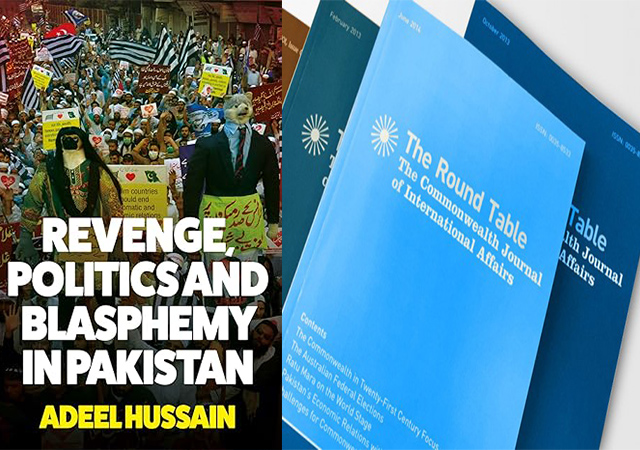
[This is an article from The Round Table: The Commonwealth Journal of International Affairs.]
Adeel Hussain has shown great courage in writing a book on blasphemy in Pakistan. Ever since the country’s creation in 1947, successive generations have struggled with defining the country’s religious identity. And, as Hussain makes clear in his narrative, those who fall foul of that definition (which has now become intertwined with political, cultural and social behaviour) are likely to pay the ultimate price with their lives. When Pakistan was first established in two wings in 1947 as separate ‘homelands’ for the Muslims of South Asia, there was no expectation that Muslims themselves would become so fixated on defining who and who was not a Muslim (excluding those who were obviously of a different faith like Christians, Hindus and Sikhs). Yet that definition has become the sub-text to any discussion about religion in terms of both peoples’ actions and their beliefs. In modern day Pakistan it is increasingly rare for anyone to lift their head above the parapet of religious conservatism, as this well-sourced, often highly critical, book illustrates.
Hussain’s narrative begins with the story of Tahir Naseem, a taxi driver in his early 50s from Illinois, who, as a follower of the Ahmadiyya Muslim Jama’at movement, had left Pakistan to escape religious persecution. Seemingly out of the blue, he began to have dreams which he believed came from God. Leaving his secure life in the United States, he returned to Pakistan to try to establish himself as a prophet, his beliefs setting him apart even from the Ahmadis. Unsurprisingly, soon after his arrival, having failed to convince anyone of his status, he was arrested for blasphemy and kept in solitary confinement for two years until his trial. Indicative of the surge in vigilante killings in modern day Pakistan, especially those caused by disputes over religion, he did not survive long enough to stand trial. In July 2020, he was gunned down in the Peshawar High Court by Faisal Khalid Khan, a 15 year-old, who maintained that Naseem was an ‘enemy of Islam’ and that he had killed him ‘because of his false claim to prophethood’, (p. 3). As the author continues: ‘It took only hours for Pakistan’s religious right to turn Khalid into a hero. Hundreds of photoshopped images with rose petals showering down on his picture popped up on Twitter’. (p. 3) The support was similar to that for Malik Mumtaz Qadri, who had assassinated the governor of the Punjab, Salman Taseer, in 2011 for having spoken out in favour of a Christian woman Asia Bibi – also accused of blasphemy and facing the death penalty (pp. 144–45).
Religion and Commonwealth values – a 2023 special edition of the Round Table Journal
Blasphemy and lynching: Religious mob rule in Nigeria and Pakistan
Research Article – Unity in diversity: constituting and constructing Pakistan’s national identity
How, Hussain asks, has Pakistan come ‘to dominate the global field on blasphemy’, as recent statistics testify? (p. 4). Reminiscent of the Inquisition carried out by Catholics against Protestants in 16th century Europe, it would appear that, in a modern South Asian context, accusations of blasphemy against the Prophet Muhammed (PBUH) began in the early 19th century as a convenient way for the traditional Muslim scholars to curtail reformist thinking which might undermine their spiritual authority and their temporal power. Enhanced by the improvement in communications, they have continued ever since.
To illustrate his narrative, Hussain charts the fate of the Ahmadi community in Pakistan. His first Chapter ‘Rebirth’ describes the rise of the Ahmadiyya movement, founded by Mirza Ghulam Ahmad in the village of Qadian. What distinguishes them is their belief that Mirza Ghulam Ahmad was indeed the ‘Madhi’ whose arrival was predicted by the Prophet. Then comes ‘Betrayal’ followed by ‘Sin’, ‘Transgression’,‘Punishment’ and ‘Redemption’ and finally his conclusion. A sub-theme is the omni-present threat of Hindu nationalism which constricts the definition of Islam still further, lest it gets absorbed into the greater larger subcontinental whole, which certain groups of individuals fought so hard to avoid.
Having charted the rise of the Ahmadis, the author describes their subsequent oppression set against the backdrop of Pakistan’s own political history, with detailed character sketches of Pakistan’s main rulers. A turning point in the Ahmadis’ history is their classification as non-Muslims by the government of Prime Minister Zulfikar Ali Bhutto in 1974, a ruling which no subsequent government has sought to reverse; instead their position (and that of other non-Muslims) became more perilous during the military dictatorship of General Zia ul-Haq (1977–1988) who strengthened the laws again blasphemy to include the death penalty.
For students wishing to understand the complexities of religious belief, Adeel Hussain’s book provides an important and challenging insight. What is depressing about his narrative is that, despite the improvement in education worldwide, logic and reason play a comparatively small part in determining people’s actions. While he supported the notion of giving a Presidential pardon to Asia Bibi, Salman Taseer tried to maintain that he was not condemning the blasphemy laws, but that the law had been misused and Asia Bibi deserved to be pardoned instead of facing the death penalty. But his logical arguments did not save his life. What the book also reveals, is how, with the long reach of social media, it is possible, as in the case of 15-year-old Faisal Khalid and Tahir Naseem’s murder in 2020, to bring religious outrage to such a fever pitch that ‘believers’ may feel inclined to take the law into their own hands, becoming heroes as a result.
Victoria Schofield is a member of the Round Table editorial board.
Revenge, politics and blasphemy in Pakistan by Adeel Hussain, London, Hurst, 2022.



